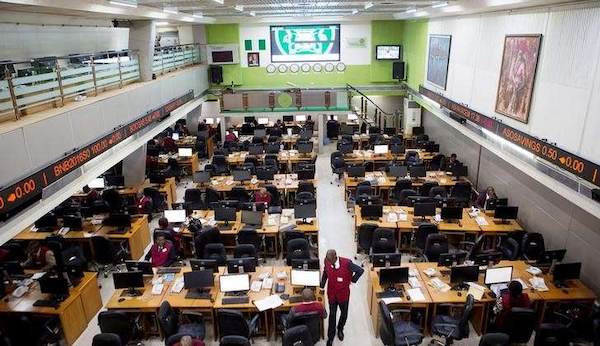Business
BLOODY FEBRUARY: Five factors that cost investors N1.37tn in stock market

The month of love left blood stains in its path as February put its fangs on investors, causing them to record their biggest loss since March last year, following a seven months bull run that made Nigerian Stock Exchange (NSE) the best performing bourse in the world in 2020.
February ended the bull run, costing investors over N1.37 trillion, after the market’s equity capitalisation ended the month at N20.82 trillion on Friday, last trading day of last month, despite recording a total turnover of 1.930 billion shares worth N20.656 billion in 24,687 deals in the last week of February.
This wasn’t enough to push the equity capitalisation of February above the N22.19 trillion January closed with.
Ripples Nigeria findings showed that investors had gained N1.13 trillion in January.
This means February wiped off the gain of January, when the N1.37 trillion loss of last month is compared to the N1.13 trillion gain of January.
Before February, Nigerian bourse had been on cloud nine since July 2020.
Ripples Nigeria understands that five major factors could have led to the loss at the stock market in February.
Factors that cost investors their money
While there could be several factors that could have been responsible for the fall in investors’ wealth on the Nigerian stock market, five factors, considered major, could have pushed the Nigerian bourse over the cliff.
Profit-taking/loss protection: For over six months, Nigerian bourse was the best performing stock market, recording it best annual return since 2013, following a return rate of 45.7 percent between January to December 2020.
As of December 22, stock holders also recorded N7.31 trillion gain, this is despite the pandemic. With such feat, it was only a matter of time for investors to come calling for their profit.
During a boom in stock market gains, investors often engage in profit-taking, carting away their investment, and this leads to crash in the stock market. Also, there are investors who were also protecting their loss during the sell-off.
CBN actions: CBN supported the stock market by reducing interest rate in the fixed income market during the pandemic. The low rate discouraged investment in bonds or debt-securities, pushing investors to go for the Nigerian stock market.
But in 2021, CBN has increased interest rate in the debt-securities, a move that’s attracting investors away from the stock market, reason why gains in the Nigerian bourse is plunging.
Investors are looking for value stores that possesses higher yields, and the CBN raising rates in the OMO auction has caused the local stock exchange to gradually lose value in the eyes of local and international investors.
Rebellious Bitcoin: As stated, investors are constantly in search of store value that will protect their wealth against inflation and grow it at the same time, Bitcoin offers that option, and investors are taking a chunk out of it.
Read also: UACN tops gainers, Lasaco maintains losing streak in Nigeria’s stock market
Although the CBN has spoken against investing in bitcoin, but the most popular cryptocurrency became a rising star among asset classes during the pandemic, and has since refused to leave the spotlight.
Bitcoin’s massive growth has been appealing to investors who are seeking quick gains and long-term wealth creation. Since the fourth quarter of 2020, bitcoin has taken the shine away from stocks and bonds in investors community.
Insecurity/regional trade dispute amid global market resurgence: While activities haven’t fully returned to normal, the resurgence of global market is gradually sucking air out of the Nigerian stock market. The bourse is no longer the only safe zone, as fixed income markets are also taking shape.
And as insecurity rises in the Northern part of Nigeria, the country becomes less appealing for investors to put in their wealth. The insecurity has led to clashes between farmers and herders – herders have been accused of using their cow to destroy crops – which has now metamorphosed into regional trade dispute.
The clash has spiralled into regional face-off between Northern and Southern part of Nigeria, as Miyetti Allah, from the North, refused to transport food produce to the South, over the South’s insistence on anti-open grazing, which has led to loss of lives, properties and farm crops.
Uncertainty surrounding earnings: Another factor pushing investors out of the Nigerian stock market is the earnings period, as companies are beginning to release their financial statements to show their financial stability.
Due to the COVID-19 pandemic which halted operations of some companies and shrinked operation of others, earnings during the full year, most especially between Q2 and Q3 2020 is expected to be impacted, so in anticipation of how it will affect companies share price value, investors are selling off their shares, taking their investment away, thereby dragging Nigerian stock market down.
By Fakoyejo Olalekan…
Join the conversation
Support Ripples Nigeria, hold up solutions journalism
Balanced, fearless journalism driven by data comes at huge financial costs.
As a media platform, we hold leadership accountable and will not trade the right to press freedom and free speech for a piece of cake.
If you like what we do, and are ready to uphold solutions journalism, kindly donate to the Ripples Nigeria cause.
Your support would help to ensure that citizens and institutions continue to have free access to credible and reliable information for societal development.






















